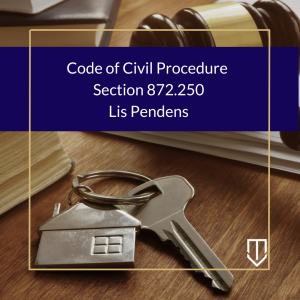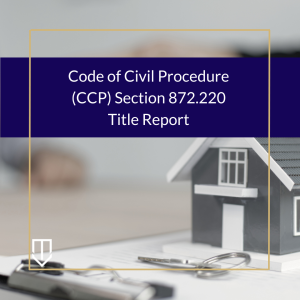 Frequently, when homeowners are dealing with financial difficulties, equity purchasers may induce homeowners to sell their homes for a fraction of the price. An “equity purchaser” is anyone who acquires title to any residence in foreclosure, with some exceptions. (Cal. Civ. Code § 1695.1(a)). The California legislature believed that homeowners were losing their homes to foreclosure due to “fraud, deception, and unfair dealing by home equity purchasers.” (Cal. Civ. Code § 1695). To combat these instances of deceit, the Legislature implemented the Home Equity Sales Contract Act, found in Title 5 of the California Code of Civil Procedure, Chapter 2.5, sections 1695.1-1695.16.
Frequently, when homeowners are dealing with financial difficulties, equity purchasers may induce homeowners to sell their homes for a fraction of the price. An “equity purchaser” is anyone who acquires title to any residence in foreclosure, with some exceptions. (Cal. Civ. Code § 1695.1(a)). The California legislature believed that homeowners were losing their homes to foreclosure due to “fraud, deception, and unfair dealing by home equity purchasers.” (Cal. Civ. Code § 1695). To combat these instances of deceit, the Legislature implemented the Home Equity Sales Contract Act, found in Title 5 of the California Code of Civil Procedure, Chapter 2.5, sections 1695.1-1695.16.
The goals of the Act are to provide homeowners with the information they need to make an informed decision regarding the sale of their home to an equity purchaser, to require that sales agreements be in writing, to protect the public against deceit and financial hardship, to encourage fair dealing in the sale and purchase of homes in foreclosure, to prohibit homeowners from being misled, to restrict unfair contract terms, to give homeowners a reasonable opportunity to rescind sales to equity purchasers, and to preserve home equities for the homeowners of California. (Cal. Civ. Code § 1695).
What Does the Home Equity Sales Contract Act Restrict?
 What is an Ouster (Civ. Code § 843)?
What is an Ouster (Civ. Code § 843)? California Partition Law Blog
California Partition Law Blog


 The California Partition Law begins at Code of Civil Procedure section 872.010 and ends at Code of Civil Procedure section 874.323. Section 872.250 outlines the procedure for a plaintiff seeking a partition of real property to record a lis pendens with the county office.
The California Partition Law begins at Code of Civil Procedure section 872.010 and ends at Code of Civil Procedure section 874.323. Section 872.250 outlines the procedure for a plaintiff seeking a partition of real property to record a lis pendens with the county office.  If you’re venturing into a real estate transaction and are daunted by the contracts, you’re certainly not alone. The jargon and intricate legal parlance can often make these contracts seem more complex than they actually are. Yet, the good news is that, armed with some guidance and understanding, these contracts become much less intimidating. Our friends at
If you’re venturing into a real estate transaction and are daunted by the contracts, you’re certainly not alone. The jargon and intricate legal parlance can often make these contracts seem more complex than they actually are. Yet, the good news is that, armed with some guidance and understanding, these contracts become much less intimidating. Our friends at  Frequently, when homeowners are dealing with financial difficulties, equity purchasers may induce homeowners to sell their homes for a fraction of the price. An “equity purchaser” is anyone who acquires title to any residence in foreclosure, with some exceptions. (Cal. Civ. Code § 1695.1(a)). The California legislature believed that homeowners were losing their homes to foreclosure due to “fraud, deception, and unfair dealing by home equity purchasers.” (Cal. Civ. Code § 1695). To combat these instances of deceit, the Legislature implemented the Home Equity Sales Contract Act, found in Title 5 of the California Code of Civil Procedure, Chapter 2.5, sections 1695.1-1695.16.
Frequently, when homeowners are dealing with financial difficulties, equity purchasers may induce homeowners to sell their homes for a fraction of the price. An “equity purchaser” is anyone who acquires title to any residence in foreclosure, with some exceptions. (Cal. Civ. Code § 1695.1(a)). The California legislature believed that homeowners were losing their homes to foreclosure due to “fraud, deception, and unfair dealing by home equity purchasers.” (Cal. Civ. Code § 1695). To combat these instances of deceit, the Legislature implemented the Home Equity Sales Contract Act, found in Title 5 of the California Code of Civil Procedure, Chapter 2.5, sections 1695.1-1695.16. The California Partition Law begins at Code of Civil Procedure section 872.010 and ends at Code of Civil Procedure section 874.323. Section 872.220 requires that the plaintiff state the existence and location of a title report if they have procured one. A title report includes a preliminary report, guarantee, binder, or policy of title insurance. (CCP § 872.010 subd. (e).)
The California Partition Law begins at Code of Civil Procedure section 872.010 and ends at Code of Civil Procedure section 874.323. Section 872.220 requires that the plaintiff state the existence and location of a title report if they have procured one. A title report includes a preliminary report, guarantee, binder, or policy of title insurance. (CCP § 872.010 subd. (e).) Generally, the seller of a home has disclosures that they are required by law to make to any prospective buyer. This also applies to the
Generally, the seller of a home has disclosures that they are required by law to make to any prospective buyer. This also applies to the